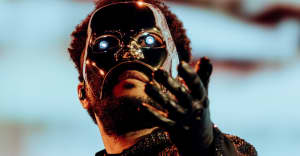The heart of Babyface’s Return of the Tender Lover, his first solo album of originals since 2005, is a simple soul ballad, called “Love and Devotion.” It's the kind of song that sits outside of time, one that, with small tweaks, could have been made by Charlie Rich in the late ‘60s, a Philadelphia soul group in the ‘70s, or any great crooner since.
Babyface is a keeper of this sound, and one of the most successful singer/songwriter/producers in the history of pop. He’s been creating hits since the mid ‘80s; in 1989, Nelson George commended him in the Village Voice for concocting soul songs that were "sentimental without being corny.” Mariah Carey paid him the ultimate tribute on “We Belong Together,” the biggest chart smash of the ‘00s, singing about how one of his '80s hits re-breaks her heart: I turn the dial, trying to catch a break, she sings, and then I hear Babyface.
Return of the Tender Lover is a comeback of sorts—its name references Tender Lover, Babyface's 1989 solo record. Back then, Babyface was on pop’s front lines. But Return makes no pretense of being up to date—you won't find any DJ Mustard beats here, just graceful funk with strings, and catlike guitar that equally recalls Quiet Storm Radio and the type of riffs favored by Rhye and Jessie Ware. And Babyface’s time away has clearly not affected his taste for sentiment. Back in 1986, he wondered what ever happened to love and true honesty, and he's still got the same concern today. Four of the nine new songs have love in the title. Though writing about art often emphasizes the importance of change, constancy has its own virtues: now that radio R&B is more sexually explicit than romantic, Babyface sounds like a maverick.
Last week, I spoke with Babyface in his dressing room, after an early morning performance on Good Morning America. We talked about why now was time to make this album, and why soulful R&B is no longer as mainstream as it was in the '90s.
This is your first album of originals in a decade. Why now?
Why not? I guess it was overdue. I did the record with Toni Braxton [2014's Love, Marriage & Divorce], and it felt good doing that. And musically, creatively, it was a good time. This shift has started in terms of what people are listening to—they’re not just so stuck on one particular thing that’s trending. You don’t have to sound like what’s on the radio for everything. In the past couple years, adult contemporary radio has been embracing R&B again.
Why do you think that is?
‘Cause they’re ready for real music.
You’ve done so much writing for other people, is it strange to start writing again for yourself?
It’s a different process. Whatever artist you’re working with, they’re all kind of different. For myself, it’s initially just trying to figure out what kind of record I could do today and not look like I’m chasing it—not look like I’m trying to stay relevant and get caught in that bubble of being the oldest man in the club. You don’t want to be that dude.
“If a song is loved, then it usually will go across the board. It doesn’t seem to happen as much as it used to. Now you have Sam Smith who will go both places, and Adele—“Hello” will be playing on the urban stations. And it’s like, ‘Okay, why?’”
Compared to the album with Braxton, the production here is more retro-feeling.
Even though it was throwback, I didn’t want it to feel dated. It’s just straight R&B. It was about feel-good music, however that sounded, however that felt. A lot of the albums I’ve done in the past have been ballads and sad and heartbreak. I didn’t want to do that. Even if it was a love song, I wanted it to have groove to it.
Earlier this year, Tyrese said the sound of R&B was dying, and that radio was limiting black singers. Have you seen the same thing?
He’s not wrong. In some cases, he’s not right. But he’s not wrong. There was a time period, mostly in the ‘90s, when R&B was pop. People were listening to it that way. Now, most artists aren’t necessarily trying to make pop R&B records. It’s a different kind of feel now. Tyrese is making straight R&B, even soul records.
If a song is loved, then it usually will go across the board. It doesn’t seem to happen as much as it used to. As [Tyrese] pointed out, now you have Sam Smith who will go both places, and Adele—“Hello” will be playing on the urban stations. And it’s like, "Okay, why?" It comes down to this, when something’s popular, radio stations will play it. If everybody’s checking it out, stations will play it. That’s why Sam Smith comes over, Adele comes over. But pop radio isn’t as open to it being the other way around.
And that’s changed since the ‘90s?
No question.
Any sense of what caused that shift?
I think there has to be a new crew of young artists that start breaking the doors, become popular, and make that happen. It’s not completely that way. You have artists of color—Nicki Minaj, Pharrell, still Usher—not quite like he used to. You have Beyoncé; you have Rihanna. There’s certain kind of records they have to make that do that. It’s just that when you’re talking about R&B, where Tyrese is—he’s like, "I want just straight R&B"—it doesn’t travel the same. One could make the argument that Frankie Beverly never really crossed over, and that’s about as R&B as it gets.
Where do you see The Weeknd fitting into this? He didn’t really have much urban radio play before he crossed into pop with “Earned It.”
You hit that one song, that can change everything. “Earned It”—he earned it. That’s one of those songs. That song is like Miguel’s “Adorn.” Another one of those records: God, I wish I wrote that one! For younger people, The Weeknd is talking a lot of stuff. He has older fans that don’t really listen close to the lyrics so they don’t know exactly what he’s saying. They’d be like "Oh, should I be singing this?" But they just like the sound and how it feels. The melodies, and the production is great. It feels so good that you don’t pay attention to the lyrics.
Have you listened to the new Adele album?
Not all of it, but I like what I’ve heard. She’s a bad girl. And she’s a great writer. I like how she wears her pain on her sleeves. That’s why it works.


